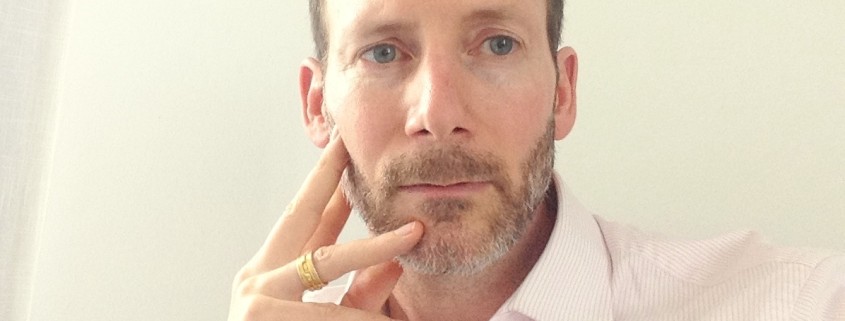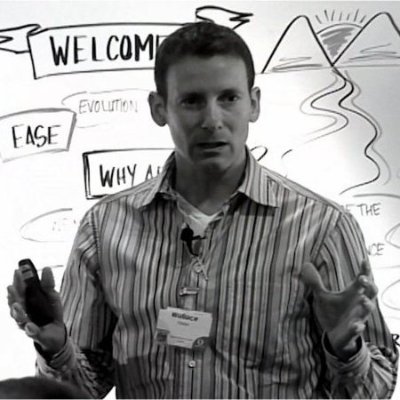StartupYard Mentor Wallace Green On Mentorship, Karma, and Customer Focus
I caught up with Wallace Green this week to discuss his experiences in Startups, his take on mentorship, and, as it turns out, his feelings about Karma and human relationships. Wallace is a popular mentor at StartupYard, and a longtime (15 year) American Expat with an infectious energy.
When Wallace and I met this week at Node5 for this interview, the first thing I noticed was that he was wearing a bright pink shirt and colorful Botas 66 sneakers – apparently his trademark look.
Clearly he doesn’t fit my stereotype of a strategy consultant. Wallace and I met a few months ago at the StartupYard mentor symposium, but we hadn’t had a chance to talk, so I was eager to meet the mentor so many of our teams had been praising for his insights.
Hi Wallace, tell us a bit about yourself and your career, and how you ended up at Capgemini in Prague.
During the peak of the dot-com bubble I joined 12snap [pronounced: one-two-snap], a Nokia Venture startup. We had a vision to create an amazing tech-culture for our Prague-based development team. I was dispatched to Silicon Valley to investigate best practices for attracting and retaining technical talent and for building a great startup culture.
Although we had good success recruiting technical talent, and building a great startup culture, like many startups of that period, 12snap didn’t survive the crash. But overall it was a great introduction to the world of startups.
Later I joined Oskar Mobile [now Vodafone CZ] where for several years I advised the Management Team on brand positioning, customer experience and other big topics of the day like 3G, MVNO’s and potential acquisitions.
And for the past seven years my specialty with Capgemini Consulting has been advising European telcos on customer experience transformation and in some cases preparing and executing full commercial turn-around strategies.
One great thing about working with Capgemini is that we do more than just strategy – oftentimes we get to stick around and support execution and go-to-market. It’s tremendously rewarding to launch something in the market, steer it to success and see the realization of business benefits.
So Capgemini has been a great channel to exercise my professional passions for branding, positioning, culture building and customer experience. I guess I’m a challenger at heart so I am particularly fond of working with clients who seek to make big changes or do things differently. I suppose my main contribution to teams at StartupYard would be my consulting experience and challenger spirit.
As a management consultant, what do you seek to gain from mentoring at StartupYard?
[Laughs] Well, that’s a very good question and I would say there are three primary reasons why I approached Cedric [Cedric Maloux, Managing Director at StartupYard Accelerator] at last year’s Demo Day to mentor in the next cycle of the [StartupYard] program.
The first reason may come across as sounding inauthentic – I hope it doesn’t, because I truly feel this way – but mentorship is an opportunity to help someone in need. Call it karma, if you like.
Why Karma?
Life has been very kind to me and I’m grateful to be where I am, living happily and contentedly here in the beautiful city of Prague. And my professional life has been an amazing journey working in some of the coolest cities in Europe and Asia, advising at an executive level with some of the biggest, most successful companies on the planet.
And at my age – I’m over forty, by the way – it’s a matter of twenty-plus years of experience: you just know things; you’re able to recognize trends and patterns; you’re a good judge of character, and you can spot talent and mobilize diverse groups of people to accomplish big things. Plus, you know how to get things done.
When I meet a budding entrepreneur in a mentoring session it feels good to share some of the learnings and wisdom that I have gained over the years.
After meeting with a startup team for the first time, I usually end by saying something like ‘I hope this was helpful’ and now and then I will get a response like ‘This was more than helpful, you may have even changed my life.’
It’s important to remember that these entrepreneurs put aside the comfort and security of regular employment – by the way, let’s not forget that most people choose the low risk path in life – they may even have families to support, and yet they have the courage to try and make it on their own. Needless to say I have tremendous respect for these individuals.
I guess you could say there is also some degree of self gratification when someone appreciates what you have to offer. It feels good to be needed, to feel appreciated and useful. I believe in karma. Good things happen when we give to others, show kindness and empathy.
And let’s be honest, the game of tech startups and venture capital funding is about risk vs. opportunity, it’s about exits with x-times return on invested capital. So the early startup phase of mentoring is pleasantly intimate, it’s an essential human-to-human activity that requires mutual trust and respect between mentor and mentee. And when the chemistry clicks – it’s magical.
Which brings me to the second reason why I choose to mentor – it’s a huge energy boost [smiling]. After the first day of mentoring I mentioned to Cedric that meeting the startups ‘totally charged my batteries’. It re-filled me with that tingling excitement one feels when starting out on a journey into the unknown. It’s been inspiring to meet the current class of startups, and a mega-dose of inspiration every now and then is a good thing.
And the last reason to do mentoring is to keep close to the investment community in case there’s an opportunity to put a skin in the game as an investor or to take on a more active role.
What are some pieces of advice you find yourself giving startup entrepreneurs over and over again?
Great question. Three themes come to mind from mentoring sessions with this year’s group at StartupYard: customer, customer and customer. I know it sounds like the old real estate cliché. But let me explain.
First, who is your target customer and what specific pain point or unmet (or unrealized) need does your product or solution address? It’s an essential question which needs to be clearly and explicitly articulated; otherwise you may end up building your business on a shaky foundation.
In reality, sometimes you have to start with a solution and work your way back to a customer and need. I’m reminded of discussions with the team from Trendlucid– they have a terrific data-driven market analysis tool to improve eShop product positioning and pricing, and to also take advantage of social sentiment. We had to do a bit of reverse engineering to clarify the customer need, but I think they are on top of things now.
Secondly, what is the vision or unique point of view that you share with your target customer or segment? With my consulting clients I oftentimes refer to this as ‘the why’. For example, is there a fundamental flaw in the existing business landscape that you feel needs to be changed?
Some refer to it as a positioning statement but I personally believe it goes deeper than just positioning, it’s more emotional. Answering this question helps a company probe deep into the purpose behind their brand. Successful companies have a brand that strongly aligns with the political, social or human values of their target segment.
For example I recall conversations with the team from Shoptsie where we defined the positioning statement ‘Make a living doing what you love.’ We felt this was a powerful way to express the brand belief that everyone who has a hobby should have an opportunity to monetize their offer even if only for modest financial gain.
The third key theme was once again about the customer: what’s the desired customer experience you want to deliver? In my view, this seemed to be the most under-addressed aspect of startups in this year’s class.
Let’s be honest, most companies in the marketplace today didn’t build their business around a desired experience. Starbucks is the classic example – where Howard Schultz first designed the experience, then built a coffee empire around what was then a largely commoditized product.
I recall conversations with the team from Testomato. They have an automated website testing solution where users get alerts when there are website errors. For the user it’s a case of ‘So, I have a problem. What shall I do next?’
[Wallace starts looking around for a whiteboard and markers, needing to draw images to help tell the story]
This was a case where the team needed to think through the entire end-to-end experience so the user not only gets information but is offered simple and easy options to either solve the problem alone or to have it solved by someone else. It’s clear that customers need a lot more help than they are currently getting and this is the opportunity space for a startup to carve to out a value-adding niche and build a successful business.
You can reach out to Wallace Via LinkedIn





